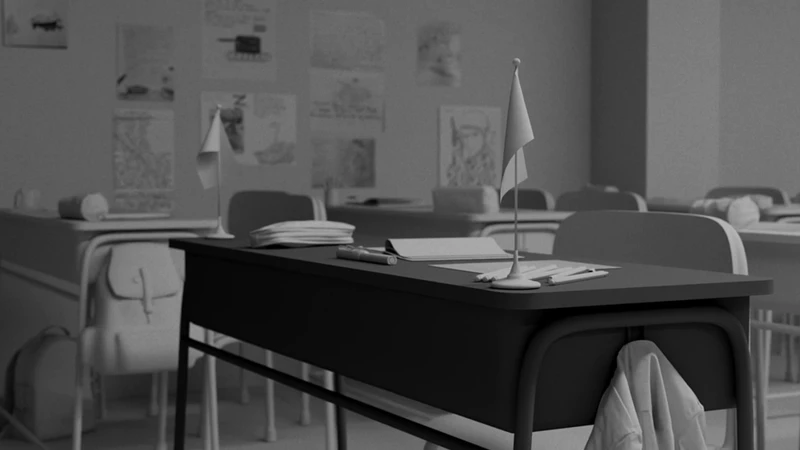Active Vocabulary
Active Vocabulary
VERDICT: A Russian teacher re-enacts her denunciation by one of her own students in director Yulia Lokshina's flawed but ambitious documentary about free speech, propaganda and state indoctrination of schoolchildren.
The case of an exiled Russian schoolteacher, who was denounced by one of her own students for criticising the war in Ukraine, becomes the jumping-off point for a free-form discourse on education, indoctrination, free speech and democracy in Active Vocabulary. Director Yulia Lokshina’s lightly experimental documentary touches on similar themes as Denmark’s official Academy Awards submission, Mr Nobody Against Putin, though this film is more uncompromisingly arty in style. Full of rich material, but a little too loosely structured and fuzzily focussed to deliver the bitingly powerful punch it might have done, Lokshina’s timely examination of creeping totalitarianism in the classroom makes its world premiere this week at Dok Leipzig. More festival bookings and niche art-house audiences are likely to follow.
The central protagonist of Active Vocabulary is Maria Kalinitscheva, an idealistic young teacher who began her career in a village called Arbagar in the remote Transbaikal province around 4000 miles east of Moscow. Shortly after Putin’s invasion of Ukraine, in February 2022, Kalinitscheva made casual remarks against the war to four of her students. One made a clandestine recording of their conversation, sharing it with her parents and the school authorities. Soon she was bombarded with hostile messages warning her to keep her “fascist” opinions to herself. A heavy-handed investigation by FSB security service followed.
In the summer of 2022, with Russia’s invasion of Ukraine in full swing, and compulsory pro-war propaganda lessons on the school curriculum, Kalinitscheva fled to Germany and applied for political asylum. In Berlin, where she is now living and teaching again, she re-stages her traumatic Russian experiences as an English-language classroom drama, intended as a kind of living civics lesson. German schoolchildren play both victim and villain roles while debating the ethics of censorship, persecution and free expression.
A fellow Russian emigre now living in Germany, Lokshina navigates these events in an elliptical, lateral-thinking, occasionally ponderous manner. She intercuts Kalinitscheva’s story with footage shot outside Moscow just days before Putin’s forces invaded Ukraine, of ballsy female protestors confronting construction workers as they try to build on a protected forest region, beginning with a new school. The connections between these threads seem tangential, though both are about illegal seizure of land, and schools as weapons in wider social battles.
In hypnotically sombre voice-over, Lokshina also includes her own fragmentary memories of the Russian education system, plus wider ruminations on how schools have always been laboratories for state indoctrination, particularity in authoritarian nations that need to prepare young minds for future wars. Brief musings about Germany’s own school safeguarding rules, designed to shield students from extremist teachers in the aftermath of the Nazi era, and the problematic track record of Czech artist Walter Womacka, whose striking Socialist Realist murals adorn the former Education Department building in East Berlin, are intriguing subplots that would have benefited from more screen time and more narrative context.
In visual terms, Active Vocabulary offers an inventive stylistic tapestry that includes straight observational documentary, computer graphics, found footage and snippets of vintage animation. Another recurring motif are square mid-screen designs that initially look like abstract expressionist paintings, but which turn out to be satellite images from the European Space Agency of Moscow, Berlin and the Ukrainian border regions that Russia is currently fighting to annexe. There are plenty of great ideas here, even if Lokshina leaves too many of them disconnected and under-explained, serving up a fascinating jigsaw puzzle with a few pieces missing.
Director, screenwriter, producer: Yulia Lokshina
Cinematographer: Nina Wesemann
Editors:Yulia Lokshina, Maya Klar
Sound: Jakob Gross
Sound Design: Alejandro Weyler
Animation: Felix Klee
Production company, world sales: Objetos Perdidos (Germany)
Venue: Dok Leipzig Festival (German Competition Documentary Film)
In German, English, Russian, Kyrgyz
82 minutes

